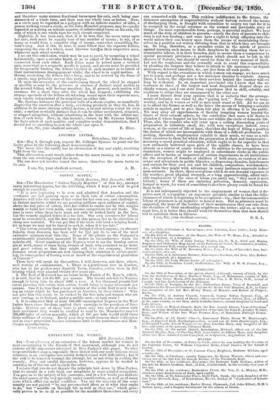EMPLOYMENT FOR WOMEN.
28th Nocember, 1&59.
San—Your advocacy of an extension of the labour market for women is most encouraging to the friends of that movement, although you do not endorse all the arguments advanced in Miss Parkes's able paper. To alter long-established usages, especially those linked with our more delicate social relations, is an enterprise necessarily hedged round with difficulties but if the evil to be removed warrant the attempt, let us not delay in seeking the remedy. Free and candid discussion, however, appears to be needed to convince us of the one and to elicit the other.
rejoice that you do not dispute the principle laid down by Miss Parkes, that we should as a rule train our daughters to seine gainful occupation. You pass on to the subject of life assurance, and in a few words you indicate the chief source of the evil specially under consideration, as well as of many more which afflict our social condition. You say the majority of the com- munity are not guided " by any preconceived ideas as to what they ought to do," but " muddle on through life as Well as they can," which gene- rally proves to be as ill as possible for the muddlers themselves and every
a one connected -with them. This rookies!) indifference to the future, thi dishonest assumption of responsibilities without having secured the means of discharging them, is fraught with calamities to society too vast for it to be accepted by the social reformer as the normal and inevitable state of things. Its most reprehensible form, perhaps, is parental neglect. We hear much of the duty of children to parents,—surely the duty of parents to chil- dren is not less binding ; and none have a right to bring offspring into the world unless they can bestow upon them the means of maintaining them- selves in a position not widely differing from that in which they are brought up. So long, therefore, as a prejudice exists in the minds of parents against insuring such means to their daughters by educating them for re- munerative labour, it is their bounden duty to secure them a competence by special pecuniary provision—a provision which should not be left to the chances of fortune, but should be cared for from the very moment of birth. Let not the suspicious and the cowardly seek to evade this responsibility by pleading the dangers they believe to attach to life assurance—as-deposit assurances, deferred annuities, &c., are free from all such perils.
With regard to the avocations in which women can engage, we have much yet to learn, and perhaps not a few mistaken theories to explode. Among these, I believe, the objection to their services behind the counter will ere long be reckoned. In an important provincial city I know that the at- tendants in three of the largest and most frequented drapers' shops are chiefly women, and I can state from experience that in skill, celerity, and readiness to oblige they are unsurpassed by the other sex. I must dissent from your opinion that it is unlucky that the arrange- ments of industry are ruled by the "paying test." None other is trust- worthy-, and by it women as well as men must stand or fall. All we can do is to afford the former as well as the latter the means of bringing a saleable article to market, and to give them fair play in offering it to the public. We may allay all apprehension of thereby tempting women beyond the limits of their natural sphere, by the conviction that none will desire to abandon it whose happier lot has been east within the circle of domestic life. Thus, also, the number who will enter upon a calling demanding years of preparation is infinitely small, for, with rare exceptions indeed, every woman, at the outset of life at least, cherishes the hope of filling a position the duties of which are incompatible with those of a difficult profession. In seeking, therefore, employments suitable to their needs, we may as a rule limit ourselves to those for which the preparation is short and inexpensive— assuming a sound practical education, which ought to be far superior to that now ordinarily bestowed upon girls of the middle classes, to have been already as a matter of course received. In addition to the occupations you enumerate, women might be employed as subordinate clerks in the public offices and in banks, as inspectors of certain departments in all institutions for the reception of females or children of both sexes, as curators of mu- seums and attendants in public libraries, as dispensing chemists, hairdressers and cutters for their own sex and for children, compositors, watchmakers, &c., while they might with advantage in many instances supersede indoor men-servants. In short, those avocations which do not demand exposure to the weather, great physical strength, or a long apprenticeship, afford suit- able employment to the class of whom you justly say, " they need it most bitterly ; many of them are enduring privation, domestic oppression, hunger or worse, for want of something to do where plenty could be found for them to do."
It is not infrequently objected to the employment of women that it de- prives men of occupation ; an argument precisely. similar to that the falla- ciousness of which is beginning to be recognized—viz., that the remunerative
labour of prisoners is an injustice to honest men. But as prisoners must be supported, the more of the burden of their maintenance they can take from the shoulders of their unoffending neighbours the better ; and so, as women must live, it is better they should work for themselves than that men should toil to maintain them in idleness.






























 Previous page
Previous page